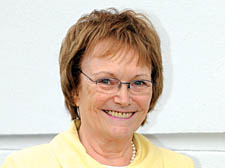|
|
 |
| |

Dame Elisabeth Hoodless
|
Government must volunteer funds to support vital helpers
Volunteers are an increasingly critical lifeline for the vulnerable – and save us millions every year, writes Dame Elisabeth Hoodless
AN incredible £174 million could be cut from the costs of caring in England if the government helped citizen volunteers to support 500,000 older and isolated people in their own homes.
Naturally, most older people prefer their own homes to institutional care. Research commissioned by Community Service Volunteers (CSV), Help the Aged and the British Red Cross reveals that older people prefer volunteers to support them rather than paid staff. Unlike most paid staff, volunteers have time and flexibility to talk and share.
The time has come for government to recognise that services provided by volunteers, far from being second class, are our best hope for a better life for citizens and certainly offer best value.
This is no less the case in Camden, where CSV’s retired and senior volunteers are behind networking projects designed to improve the health and wellbeing of disabled and housebound people. The volunteers use telephones to do one-to-one support of housebound and isolated people, helping to reduce stress by providing emotional and practical information support for those affected.
CSV also sends volunteers directly into the homes of older people in Camden to give them advice on how to tackle the increasing worry of fuel poverty. These ExxonMobil Energy Champions are protecting the lives of older people by giving them the confidence to turn their heating back on and avoid waste.
CSV also sends senior volunteers into hard-to-reach communities who often feel remote from the local health services on offer. One of our co-ordinators recently told me that you can have all the glossy health information you like, but it’s no good if it doesn’t actually get into the homes of the people most in need.
So far in Camden 135 volunteers have helped 3,500 people by taking health information directly into homes through their visits. Ninety-three per cent say they received information from volunteers that would directly benefit them, 57 per cent of the beneficiaries are Camden’s black minority ethnic communities and 98 per cent say they are disabled.
As a result, a musical network is also being set up where volunteer wandering minstrels go directly into the homes of isolated people and “serenade” them.
Healthcare for the elderly is not the only sector that could be transformed through volunteering. Volunteers already add value to schools, prisons, crime prevention and social services. Volunteers reduce reoffending, transform the lives of mental health service users and work powerfully with the families of children at risk, but the resource they offer is largely untapped.
The first-ever volunteers in child protection in Bromley and in Sunderland have been helping to prove initial sceptics wrong. They have worked alongside social service professionals, helping more than 50 families. Their regular support and practical help has led to more than two-thirds of the families coming off the at-risk register. This is a model that could benefit Camden too.
Independent evaluation by Professor Jane Tunstill of King’s College London reveals extraordinary examples of children returning to school after long absences, of fridges removed from back gardens and shelves fixed, of mothers enabled to overcome depression and access training to become classroom assistants.
Most striking has been the confidence that the volunteers have built up to enable parents to engage with the system: how to be honest with social workers without losing their temper; securing places at chosen schools; and how to cope with the three or more officials calling at their home. While initially hesitant, social workers now view the volunteers’ contributions as a positive resource supporting their work.
Sadly, these examples of opening doors to volunteer involvement in care services are the exception. We need to ask ourselves what are the next steps to ensuring that volunteers become part of the DNA of our public services?
Every department of state, health and social care, education, justice, communities and local government, should develop a strategy to involve citizens in its work. As Barack Obama’s campaign manager put it: “Don’t just talk at people, give them something useful to do.”
Training for doctors, nurses, social workers, teachers, police officers and more should include how to harness citizens’ energy in their work.
Successive governments have affirmed the value of volunteers in both service delivery and as strengtheners of civil society and builders of social capital. Were volunteers to go on strike, the nation would be in crisis as frail older people, mental health service users, children at risk and many people with disabilities would lose support. The value of volunteer engagement exceeds £40 billion a year.
However, there are modest costs, recruiting, screening, matching, supporting and recognising volunteers. At a time when national and local services need to secure best value in the delivery of public services, it is time that government accepted responsibility for these costs so that volunteer organisers can focus their energy and skills on involving citizens; not endlessly fundraising to help it happen.
• Dame Elisabeth Hoodless, a former Islington Labour councillor, is executive director of Community Service Volunteers (CSV)
|
 |
|
| |
|
 |
|